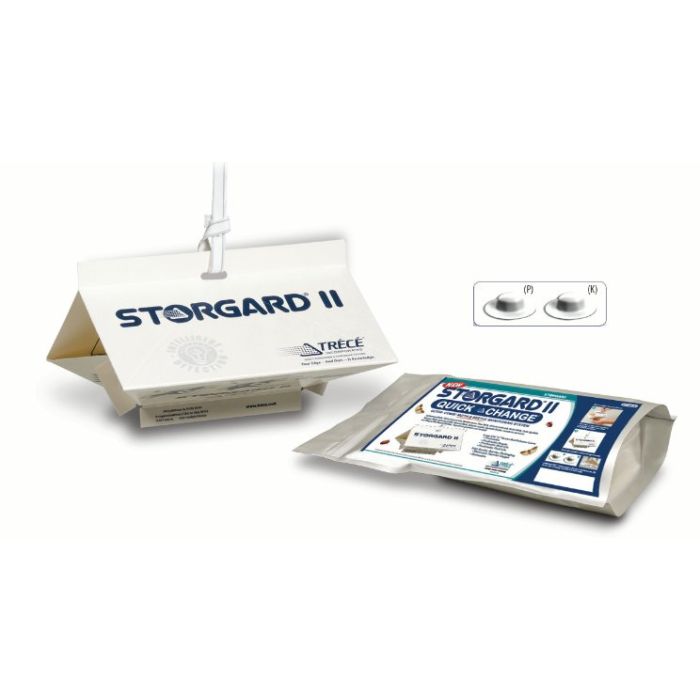Storgard II Ultra Combi Quick Change Moth & Beetle Monitoring System
Blacktown, NSW
In StockUnit 1, Building 2 / 13 Bessemer Street
Blacktown
NSW
2148
Monday to Friday 7:00AM - 4:00PM
Phone: Globe Pest: (02) 9827 1333 | Nuturf: (02) 9395 1200
Email: pestwp@globeaus.com.au
Globe Pest Solutions, Padstow NSW
In Stock39 Gow Street
Padstow
NSW
2211
Newcastle, NSW
Awaiting Stock11 Nevin Close
Gateshead
NSW
2290
Tullamarine, VIC
In Stock19 Silicon Place
Tullamarine
VIC
3043
Globe Pest Solutions, Brisbane QLD
In Stock579 Boundary Road
Archerfield
QLD
4108
Stapylton, QLD
Awaiting Stock82 Christensen Road
Stapylton
QLD
4207
Welland, SA
In Stock134-140 Frederick St
Welland
SA
5007
Kwinana Warehouse, WA
In Stock16 Thomas Rd
Kwinana Beach
WA
6167
The Storgard II Ultra Combi Quick Change monitoring system is a pre-baited, high-powered, and cost-effective method of detecting moth and beetle activity at the early stages. It uses synthetic sex and aggregation pheromones along with two kairomone attractants that lure beetles, into a specially designed pitfall trap that contains a kairomone oil that retains the beetles.
Early detection of beetle activity allows control measures to be employed before large quantities of stored food products are contaminated by larvae.
Key features of the Storgard II Ultra Combi Quick Change Moth & Beetle Monitoring Traps
- Contains a pack of 6 pre-baited glue traps (non-reusable)
- Professional solution in a low-profile trap
- Contains slow-release lures already blended in with the adhesive
- Safe and effective monitoring solution
- Protected area: 51-100m2
- Designed to be placed near insect-activity zones but away from heat
When to monitor for insects
As a general rule, most insect development ceases at average temperatures below 12˚C. In heated warehouses or in warm climates a year-round monitoring program is essential for early detection of stored product pests. Even in unheated storage areas in cold climates, it is important to recognise locations that may provide sources of heat. For example, temperatures surrounding machinery may be su cient to promote insect development even though temperatures nearby are below the 12˚C threshold.
Trap density and placement
A good rule when beginning a monitoring program is to place traps in a grid pattern at intervals of 9 meters to 15 metres (1 trap every 100 sq. metres). Tighten the grid as needed in order to pinpoint the source of an infestation. Other areas that traps should be placed are near suspected sources of contamination, such as in or around equipment and close to ducts where dust may accumulate.
The main criteria for selecting trap placement is convenience for monitoring personnel and protection against damage by equipment, water, etc. Although trap placement is not critical, research has shown that capture efficiency can be maximized by placing traps on a solid floor and near cracks, crevices, equipment racking, poles, building columns, etc.
When to inspect the trap
Traps should be inspected at least once a week and twice weekly if an infestation is suspected. In some situations, it may be desirable to check traps every day. Keep a record of the number of insects caught in each trap and the monitoring site.
Service and storage
The Storgard Quick Change monitoring system requires a minimum of service. However, it is important to replace the Lure Tray every four to eight weeks since their attractant properties eventually degrade. Removal of dead insects and debris when traps are inspected is an option. Replace the Lure Tray more often under dusty conditions. Please note: Like lm, batteries, and similar products, pheromone caps should be stored in a cool place. For the longest possible storage life, store lure trays in a refrigerator and keep their foil barriers sealed.
| Brand | Other Brands |
|---|---|
| Australian Made | No |
| Environment Type | Indoor |

